Politics
Under US pressure, Syria and Israel inch toward security deal
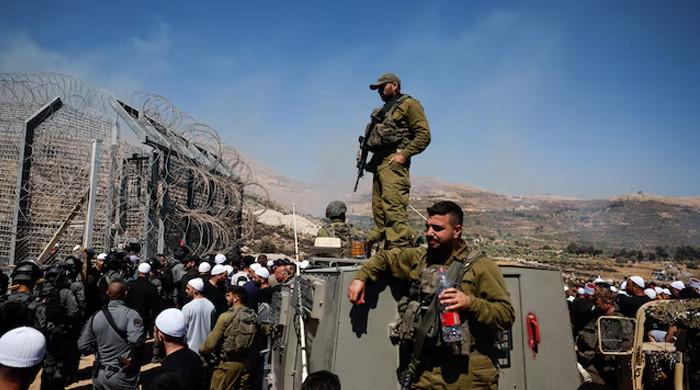
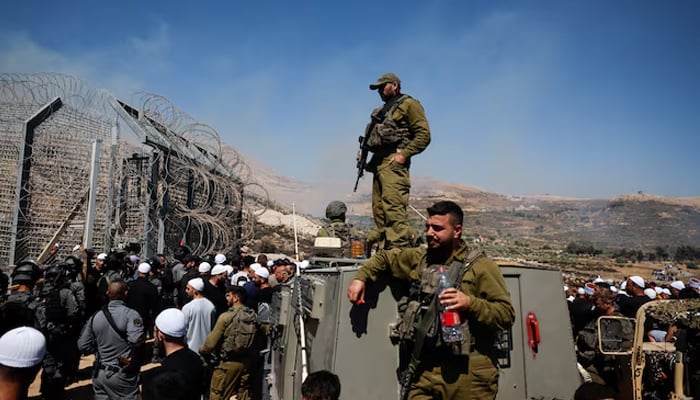
- Syrians want limited deal; normalisation remains distant.
- Israel leverages Sweida unrest to press for broader concessions.
- Israel pushes to expand demilitarised zone across Syria’s south.
Under US pressure, Syria is accelerating talks with Israel for a security pact that Damascus hopes will reverse Israel’s recent seizures of its land but that would fall far short of a full peace treaty, sources briefed on the talks said.
Washington is pushing for enough progress to be made by the time world leaders gather in New York for the UN General Assembly at the end of this month to allow President Donald Trump to announce a breakthrough, four of the sources told Reuters.
Even a modest agreement would be a feat, the sources said, pointing to Israel’s tough stance during months of talks and Syria’s weakened position after sectarian bloodshed in its south inflamed calls for partition.
Reuters spoke to nine sources familiar with the discussions and with Israel’s operations in southern Syria, including Syrian military and political officials, two intelligence sources and an Israeli official.
They said Syria’s proposal aims to secure the withdrawal of Israeli troops from territory seized in recent months, to reinstate a demilitarised buffer zone agreed in a 1974 truce, and to halt Israeli air strikes and ground incursions into Syria.
The sources said talks had not addressed the status of the Golan Heights, which Israel seized in a 1967 war. A Syrian source familiar with Damascus’s position said it would be left “for the future.”
The two countries have technically been at war since the creation of Israel in 1948, despite periodic armistices. Syria does not recognise the state of Israel.
After months of encroaching into the demilitarised zone, Israel abandoned the 1974 truce on December 8, the day a rebel offensive ousted Syria’s then-president Bashar al-Assad. It struck Syrian military assets and sent troops to within 20 kilometres (12 miles) of Damascus.
Israel has shown reluctance during the closed-door talks to relinquish those gains, the sources said.
“The US is pressuring Syria to accelerate a security deal — this is personal for Trump,” said an Israeli security source, who said the US leader wanted to present himself as the architect of a major success in Middle Eastern diplomacy.
But, the source said, “Israel is not offering much.”
The offices of Israeli Prime Minister Benjamin Netanyahu and Strategic Affairs Minister Ron Dermer, who has been leading the negotiations, did not respond to Reuters questions.
A State Department official said Washington “continues to support any efforts that will bring lasting stability and peace between Israel, Syria and its neighbours.” The official did not answer questions on whether the US wanted to announce a breakthrough during the General Assembly.
Trust deficit at talks
Israel has voiced hostility to Syrian government, pointing to President Ahmed al-Sharaa’s former links with fighter groups, and has lobbied Washington to keep the country weak and decentralised.
But the US has encouraged talks — keen to expand the countries that signed peace deals with Israel under the Abraham Accords during Trump’s first administration.
Exploratory contacts began in Abu Dhabi following Sharaa’s April visit to the Emirates, which have ties with Israel. The two sides then met in the Azerbaijani capital Baku in July.
Days later, discussions were plunged into disarray when Syrian troops deployed to the southwestern Sweida region to quell sectarian violence between Bedouin and Druze militias. Israel said the deployment violated its enforcement of a “demilitarised zone” and bombed the defence ministry in Damascus. Sharaa accused it of seeking pretexts to interfere in Syria’s south.
A US-brokered ceasefire ended the violence and, a month later, bilateral negotiations resumed in Paris — marking the first time Syria publicly acknowledged holding direct talks with its longtime foe.
However, the atmosphere in the room was tense, with a lack of trust between the two sides, according to two Syrian sources and a Western diplomat.
Negotiators are following a phased process modelled on deals Israel reached with Egypt that paved the way for a landmark normalisation of relations in 1980. That involved the return to Egypt of the Sinai peninsula, seized by Israel in the 1967 war.
Six sources briefed on the talks said Israel would be unwilling even in the longterm to return the Golan, which Trump unilaterally recognised as Israeli in his first term.
Instead, Israel floated a proposal to the US special envoy for Syria, Thomas Barrack, that it could withdraw from southern Syria in return for Sharaa relinquishing the Golan, the Israeli official said.
“Our feelers via the Americans suggest this is a non-starter,” the official said. Netanyahu’s office, Dermer’s office and the US State Department did not respond to questions on the swap proposal.
A Syrian official told Reuters that Sharaa understood that “any compromise on the Golan would mean the end of his rule” and had told Barrack the security pact must be anchored in the 1974 lines.
While Sharaa is willing to accelerate talks with Israel to please Washington, he remains wary, according to a Western intelligence officer, the Israeli official and Syrian source.
He has told Barrack that conditions are not yet ripe for a broad peace agreement. “The basic elements of trust are simply not there,” said the Syrian official.
A senior US administration official told Reuters that Trump was clear when he met Sharaa in May in Riyadh that “he expected Syria to work towards peace and normalisation with Israel and its neighbors.”
“The Administration has actively supported this position since then,” the official said. “The President wants peace throughout the Middle East.”
Narrow path for Sharaa
Realities on the ground have limited the Syrian leader’s options.
On the one hand, Israel’s incursions and support for the Druze have hardened Syrian public opinion against any deal, a factor weighing on Sharaa, officials say.
On the other, Israel’s land grabs in Syria pose a threat to Damascus, making a de-escalatory pact all the more important for Sharaa.
A Syrian military officer based near the border with Israel, who asked not to be identified, said Syrian army patrols in the south avoid confronting Israeli troops, who regularly raid villages and go door-to-door collecting household data and searching for arms.
In response to Reuters questions, the Israeli military said its operations had discovered “numerous weapons”, thwarted smuggling attempts and apprehended “dozens of suspects involved in advancing terrorist activity”, without providing further details.
The Israeli military was operating in southern Syria to protect Israel and its citizens, the statement said. Israel has threatened air strikes on any significant Syrian military or intelligence presence near the border without its consent.
Israel uses its new post at Mount Hermon, which it seized after Assad’s fall, to surveil the region. Defence Minister Israel Katz said last month Israel would not cede the location.
Israel’s military has imposed buffer zones in some neighbouring countries following the October 7, 2023 attack on Israel by Hamas, in which some 1,200 people were killed. Israel’s nearly two-year campaign against Hamas has killed nearly 65,000 people in Gaza, according to local authorities.
“As in northern Gaza and southern Lebanon, Israel is now enforcing a wider demilitarised zone in southern Syria,” Syrian security analyst Wael Alwan said.
Druze developments bolstered Israel
Israel’s position has been strengthened by developments in Sweida, where Syrian forces stand accused of execution-style killings of Druze civilians. Druze leaders are calling for independence and a humanitarian corridor from Golan to Sweida — a challenge to Sharaa’s vow to centralise control of Syrian territory.
Two senior Druze figures, who requested anonymity due to the sensitivity of the matter, said that since the Sweida fighting, Israel was helping unify splintered Druze factions and had delivered military supplies including guns and ammunition to them.
The two Druze commanders and a Western intelligence source said that Israel was also paying salaries for many of the roughly 3,000 Druze militia fighters.
Reuters was not able to independently confirm the munitions supplies nor the payments. The offices of Netanyahu and Dermer did not respond to Reuters questions on support for the Druze militia.
Syrian Foreign Minister Asaad al-Shibani dismissed the possibility of a humanitarian corridor at the Paris talks, saying it would infringe on Syria’s sovereignty, according to a Syrian official familiar with the discussions.
Both sides agreed that stability in Syria’s south was key to preventing a resurgence of covert agents linked to Iran, Lebanese armed group Hezbollah or Palestinian resistance groups — common enemies of Israel and Syria’s new leaders. Israel agreed to allow interior ministry forces to deploy checkpoints in Sweida.
“Both parties are probing areas of common ground,” said the Syrian official.
Sharaa is keen not to provoke his southern neighbour, aware of how much damage its military can inflict, one close aide said on condition of anonymity: “Avoiding confrontation is central to his plan to rebuild and govern.”
Erdem Ozan, a former Turkish diplomat and expert on Syria, said Sharaa could accelerate talks to secure economic aid and reconstruction support from investors, Gulf benefactors and Washington.
“Sharaa’s focus on economic delivery could push him toward pragmatic concessions, but he’ll need to balance this with maintaining legitimacy among his supporters,” Ozan said.
Concessions could include handing greater autonomy to regional groups, including the Kurds and Druze, Ozan said, as well as demilitarisation near Syria’s borders with Israeli and Jordan.
Politics
Trump invites more leaders to join Gaza ‘Board of Peace’
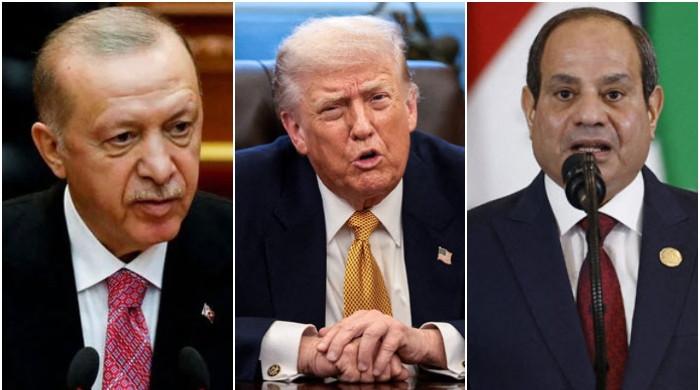
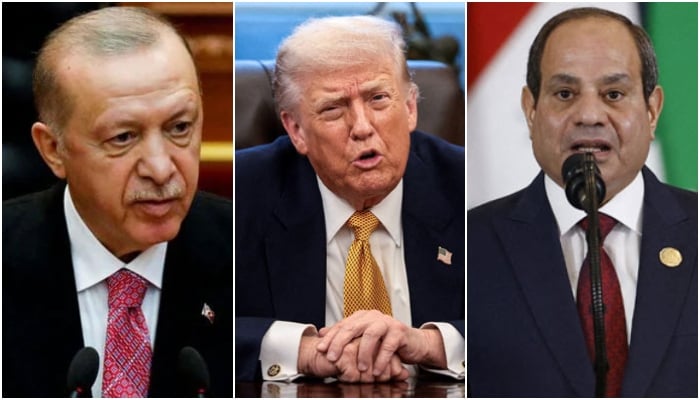
- Cairo “studying” request for Sisi to join board, says FM.
- Canadian PM intends to accept Trump’s invitation: aide.
- Argentine president says it will be an ‘honour’ to join initiative.
WASHINGTON: US President Donald Trump’s so-called “Board of Peace” for postwar Gaza began to take shape Saturday, with the leaders of Egypt, Turkey, Argentina and Canada asked to join.
The announcements from those leaders came after the US president named his Secretary of State Marco Rubio, former British prime minister Tony Blair, and senior negotiators Jared Kushner and Steve Witkoff to the panel.
Trump had already declared himself the chair of the body, as he promotes a controversial vision of economic development in the Palestinian territory, which lies in rubble after two-plus years of relentless Israeli bombardment.
The moves came after a Palestinian committee of technocrats meant to govern Gaza held its first meeting in Cairo which was attended by Kushner, Trump’s son-in-law who has partnered with Witkoff for months on the issue.
In Canada, a senior aide to Prime Minister Mark Carney said he intended to accept Trump’s invitation, while in Turkey, a spokesman for President Recep Tayyip Erdogan said he had been asked to become a “founding member” of the board.
Egypt’s Foreign Minister Badr Abdelatty said Cairo was “studying” a request for President Abdel Fattah al-Sisi to join.
Sharing an image of the invitation letter, Argentine President Javier Milei wrote on X that it would be “an honour” to participate in the initiative.
In a statement sent to AFP, Blair said: “I thank President Trump for his leadership in establishing the Board of Peace and am honoured to be appointed to its Executive Board.”
Blair is a controversial figure in the Middle East because of his role in the 2003 invasion of Iraq. Trump himself said last year that he wanted to make sure Blair was an “acceptable choice to everybody.”
Blair spent years focused on the Israeli-Palestinian issue as representative of the “Middle East Quartet” – the United Nations, European Union, United States and Russia – after leaving Downing Street in 2007.
The White House said the Board of Peace will take on issues such as “governance capacity-building, regional relations, reconstruction, investment attraction, large-scale funding and capital mobilisation.”
The other members of the board so far are World Bank President Ajay Banga, an Indian-born American businessman; billionaire US financier Marc Rowan; and Robert Gabriel, a loyal Trump aide who serves on the US National Security Council.
Trump has created a second “Gaza executive board” that appears designed to have a more advisory role.
It was not immediately clear which world leaders were asked to be on each board.
The White House, which said Friday that additional members would be named to both entities, did not immediately reply to a request for comment.
Israel strikes
Washington has said the Gaza plan had gone on to a second phase – from implementing the ceasefire to disarming Hamas, whose October 2023 attack on Israel prompted the massive Israeli offensive.
On Friday, Trump named US Major General Jasper Jeffers to head the International Stabilization Force, which will be tasked with providing security in Gaza and training a new police force to succeed Hamas.
Jeffers, from special operations in US Central Command, in late 2024 was put in charge of monitoring a ceasefire between Lebanon and Israel, which has continued periodic strikes aimed at Hezbollah.
Gaza native and former Palestinian Authority deputy minister Ali Shaath was earlier tapped to head the governing committee.
Trump, a real estate developer, has previously mused about turning devastated Gaza into a Riviera-style area of resorts, although he has backed away from calls to forcibly displace the population.
Politics
India slaps $2.45m fine on IndiGo for mass flight cancellations
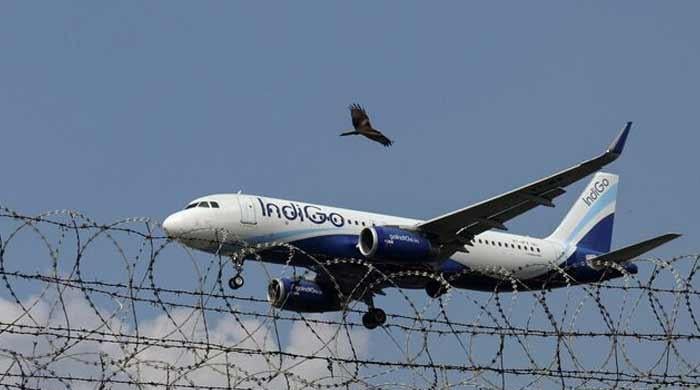
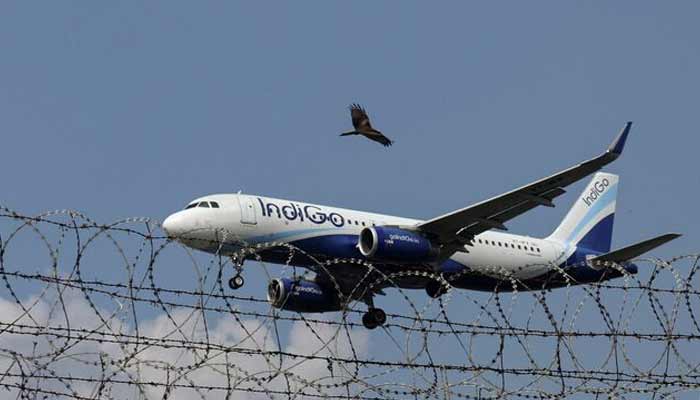
- Private carrier admits misjudgement, planning gaps.
- Regulator orders IndiGo to relieve senior office bearers.
- Operational meltdown linked to new policy of pilot rest.
India’s civil aviation regulator on Saturday imposed a fine of $2.45 million on IndiGo, the country’s biggest airline, for poor roster planning that led to large-scale flight cancellations in December.
Airports across India were thrown into disarray late last year, with the private carrier admitting “misjudgement and planning gaps” in adapting to a new policy of pilot rest.
Over 4,000 mostly domestic flights were either cancelled or delayed for over a week across the country, stranding hundreds of thousands of passengers.
The operational meltdown came even though IndiGo had two years to prepare for the new rules aimed at giving pilots more rest periods in between flights to enhance passenger safety.
The Directorate General of Civil Aviation (DGCA) said it was levying the penalty for several lapses, including “failure to strike (a) balance between commercial imperatives and crew members’ ability to work effectively”.
The regulator ordered IndiGo to relieve its senior vice president of its operations control centre of his responsibilities, according to a statement released on Saturday.
It also issued warnings to senior officials at the company, including CEO Pieter Elbers “for inadequate overall oversight of flight operations and crisis management”.
There was no immediate response from IndiGo to the fine.
IndiGo, which commands 60% of India’s domestic market, operates more than 2,000 flights a day.
The crisis was one of the biggest challenges faced by the no-frills airline that has built its reputation on punctuality.
India is one of the world’s fastest growing aviation markets. In November 2024, IndiGo reached a daily level of 500,000 passengers for the first time.
Politics
Protesters rally in Denmark and Greenland against Trump annexation threat
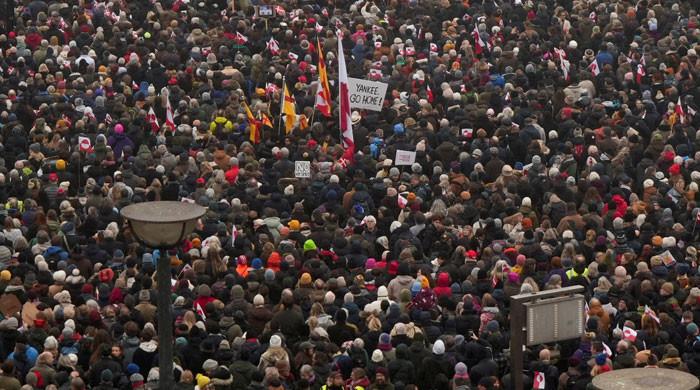
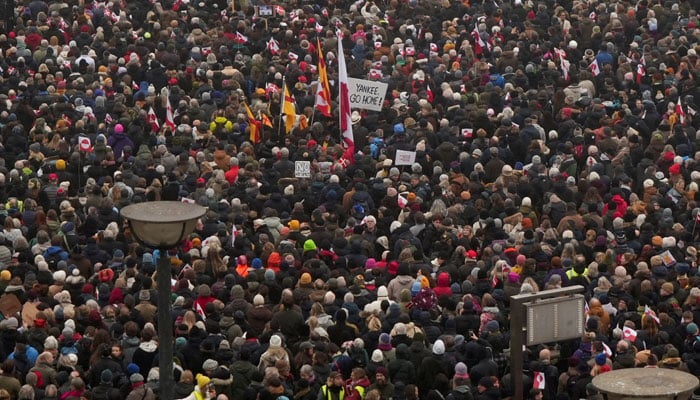
- Protesters chant, “Greenland is not for sale.”
- Over “20,000 people” attend protest in Copenhagen.
- Trump says Greenland vital to US security.
COPENHAGEN: Protesters in Denmark and Greenland demonstrated on Saturday against President Donald Trump’s demand that the Arctic island be ceded to the US and called for it to be left to determine its own future.
Trump says Greenland is vital to US security because of its strategic location and large mineraldeposits, and has not ruled out using force to take it. European nations this week sent military personnel to the island at Denmark’s request.
In Copenhagen, demonstrators chanted “Greenland is not for sale” and held up slogans such as “No means No” and “Hands off Greenland” alongside the territory’s red-and-white flag as they marched to the US embassy.
Some wore red baseball caps resembling the “Make America Great Again” caps of Trump supporters, but with the slogan “Make America Go Away”.

In Greenland’s capital Nuuk, hundreds of protesters led by Prime Minister Jens-Frederik Nielsen carried flags and similar banners as they headed for the US consulate.
They passed a newly built block where Washington plans to move its consulate – currently a red wooden building with four staff.
Organisers estimated over 20,000 people attended the protest in Copenhagen – akin to the entire population of Nuuk – though police did not provide an official figure. Other protests were held across Denmark.
“I am very grateful for the huge support we as Greenlanders receive … we are also sending a message to the world that you all must wake up,” said Julie Rademacher, chair of Uagut, an organisation for Greenlanders in Denmark.
Trump triggers diplomatic rift
Trump’s repeated statements about the island have triggered a diplomatic crisis between the US and Denmark, both founding members of the NATO military alliance, and have been widely condemned in Europe.
The territory of 57,000 people, governed for centuries from Copenhagen, has carved out significant autonomy since 1979 but remains part of Denmark, which controls defence and foreign policy, and funds much of the administration.
Some 17,000 Greenlanders live in Denmark, according to Danish authorities.
All five parties elected to Greenland’s parliament ultimately favour independence, but they disagree on the timing and have recently said they would rather remain part of Denmark than join the US
Only 17% of Americans approve of Trump’s efforts to acquire Greenland, and large majorities of Democrats and Republicans oppose using military force to annex it, a Reuters/Ipsos poll found. Trump called the poll “fake”.
-

 Tech5 days ago
Tech5 days agoNew Proposed Legislation Would Let Self-Driving Cars Operate in New York State
-

 Sports7 days ago
Sports7 days agoClock is ticking for Frank at Spurs, with dwindling evidence he deserves extra time
-
Sports1 week ago
Commanders go young, promote David Blough to be offensive coordinator
-

 Entertainment4 days ago
Entertainment4 days agoX (formerly Twitter) recovers after brief global outage affects thousands
-

 Fashion7 days ago
Fashion7 days agoSouth India cotton yarn gains but market unease over US tariff fears
-

 Fashion7 days ago
Fashion7 days agoChina’s central bank conducts $157-bn outright reverse repo operation
-

 Business1 week ago
Business1 week agoSoftBank reduces Ola Electric stake to 13.5% from 15.6% – The Times of India
-

 Sports7 days ago
Sports7 days agoUS figure skating power couple makes history with record breaking seventh national championship






